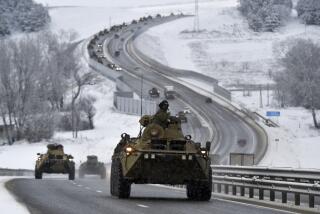What Price Gulf Freedom? : Oil-state allies should pay deployment costs
- Share via
Hat in one hand and begging bowl in the other, the United States is again about to begin knocking on doors to solicit international financial support for its operations in the Persian Gulf. Like last September’s initial fund-raising drive, this exercise in cajolery and supplication seems likely to prove an embarrassing and even a humiliating experience. That the undertaking is also--or should be--wholly unnecessary is self-evident.
There’s no question about which countries ought to bear the heaviest economic costs for the effort to contain Saddam Hussein’s aggressive ambitions: Those that benefit most are most properly responsible for footing the bill. That means Saudi Arabia and the now exiled government of Kuwait above all others. To a lesser extent it means the smaller oil-producing gulf states whose freedom of action and even political independence are imperiled if Iraq’s hegemonic aims aren’t checked. And it means Japan and other countries that rely so heavily on imported oil.
Every country, of course, gains when aggression is thwarted because every country is better off in a safer and more decent world. That is the political and moral principle underlying the military intervention by the United States and other countries. But the question of control of oil resources and the fixing of future oil prices--a question vital to the world’s economic security and development--also looms large in the rationale for intervention. Keeping the vast oil deposits of Kuwait and Saudi Arabia out of Iraq’s hands is another key reason for intervention.
Because the United States intervened there’s a good chance that the ruling royal government of Kuwait can in time get its country back, and the ruling royal family of Saudi Arabia can keep its country from being lost. Rescuing countries for the families that effectively own them is no small thing. It deserves much more than a reluctant or ungenerous response.
Kuwait and Saudi Arabia can easily afford to pay for their own protection. At last estimate Kuwait’s rulers had about $100 billion invested overseas, safely out of Iraq’s reach. Saudi Arabia, meanwhile, has profited hugely from the rise in world oil prices--about $10 a barrel--that followed the Aug. 2 invasion of Kuwait. To make up for embargoed Iraqi and Kuwaiti oil, Saudi Arabia has boosted its own production to 8.5 million barrels a day, as Western countries requested. But that turns out to be worth about $22 billion a year just in windfall profits for the Saudis, plus another unexpected $85 million a day or so from higher production.
Washington shouldn’t hesitate to bluntly insist that the gulf’s oil-producing states pay most of the deployment costs the United States faces in the coming year. It is their territory, their resources and the lives of their rulers and people that the intervention aims to protect. What’s owed, in short, is a debt of honor that ought to be quickly and voluntarily paid so that the United States can be spared the uncomfortable and even absurd task of asking rich governments to meet their obligations.
More to Read
Sign up for Essential California
The most important California stories and recommendations in your inbox every morning.
You may occasionally receive promotional content from the Los Angeles Times.













